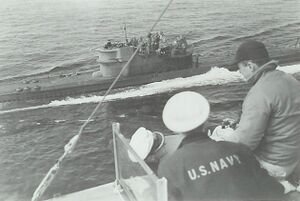Difference between revisions of "German submarine U-234"
(WW2 event) |
(replace with new video - account terminated by YouTube) |
||
| Line 11: | Line 11: | ||
Even after the war ended, documents reporting the uranium cargo on U-234 remained classified. The material may have been used in later U.S. atomic test blasts in [[Nevada]] and the [[Bikini atoll]] in the Pacific, or even the bombs that were dropped on Japan<ref>http://greyfalcon.us/the%20U.htm</ref><ref>https://military-history.fandom.com/wiki/German_submarine_U-234#cite_note-Wilcox-9</ref>. | Even after the war ended, documents reporting the uranium cargo on U-234 remained classified. The material may have been used in later U.S. atomic test blasts in [[Nevada]] and the [[Bikini atoll]] in the Pacific, or even the bombs that were dropped on Japan<ref>http://greyfalcon.us/the%20U.htm</ref><ref>https://military-history.fandom.com/wiki/German_submarine_U-234#cite_note-Wilcox-9</ref>. | ||
{{YouTubeVideo | {{YouTubeVideo | ||
| − | |code= | + | |code=ATd8rB9w4Sw |
|caption=Nazi Uranium for the Manhattan Project: 1945 WWII: U-Boat U-234 with U-235 cargo | |caption=Nazi Uranium for the Manhattan Project: 1945 WWII: U-Boat U-234 with U-235 cargo | ||
}} | }} | ||
Latest revision as of 07:36, 14 September 2023
 U-234 surrendering. Crewmen of Sutton (DE-771) in foreground with Kapitänleutnant Johann-Heinrich Fehler (left-hand white cap) | |
| Description | A German submarine carrying uranium and high technology. Surrendered to the United States in 1945. |
|---|---|
German submarine U-234 was a Type XB U-boat of Nazi Germany's Kriegsmarine during World War II, she was commanded by Kapitänleutnant Johann-Heinrich Fehler. Her first and only mission into enemy or contested territory consisted of the attempted delivery of uranium oxide and German advanced weapons technology to the Empire of Japan. After receiving Admiral Dönitz' order to surface and surrender and of Germany's unconditional surrender, the submarine's crew surrendered to the United States on 14 May 1945.
Even after the war ended, documents reporting the uranium cargo on U-234 remained classified. The material may have been used in later U.S. atomic test blasts in Nevada and the Bikini atoll in the Pacific, or even the bombs that were dropped on Japan[1][2].
| Nazi Uranium for the Manhattan Project: 1945 WWII: U-Boat U-234 with U-235 cargo |
Secret cargo
A classified US intelligence summary written on 19 May listed U-234's cargo as including drawings, arms, medical supplies, instruments, lead, mercury, caffeine, steels, optical glass and brass.[3] That the ship carried 1,200 pounds (540 kg) of uranium oxide remained classified for the duration of the Cold War.[4]. The exact characteristics of the uranium remain unknown; Scalia and historians Carl Boyd and Akihiko Yoshida have speculated that rather than being weapons-grade material it was instead intended for use as a catalyst in the production of synthetic methanol for aviation fuel.[5] However, after the war it was learned that the Japanese had cyclotrons and were working on the atomic bomb.[6]
The 1,200 pounds (540 kg) of uranium disappeared. It was most likely transferred to the Manhattan Project's Oak Ridge diffusion plant. The uranium oxide would have yielded approximately 7.7 pounds (3.5 kg) of 235U after processing, around 20% of what would have been required to arm a contemporary fission weapon.[7]
Passengers
U-234 was carrying twelve passengers, including a German general, four German naval officers, civilian engineers and scientists and two Japanese naval officers. The German personnel included General Ulrich Kessler of the Luftwaffe, who was to take over Luftwaffe liaison duties in Tokyo; Kay Nieschling, a Naval Fleet Judge Advocate who was to rid the German diplomatic corps in Japan of the remnants of the Richard Sorge spy ring; Heinz Schlicke, a specialist in radar, infrared, and countermeasures and director of the Naval Test Fields in Kiel (later recruited by the US in Operation Paperclip); and August Bringewalde, who was in charge of Me 262 production at Messerschmitt.[8]
The Japanese passengers were Lieutenant Commander Hideo Tomonaga of the Imperial Japanese Navy, a naval architect and submarine designer who had come to Germany in 1943 on the Jsub I-29, and Lieutenant Commander Shoji Genzo, an aircraft specialist and former naval attaché.[9]
References
- ↑ http://greyfalcon.us/the%20U.htm
- ↑ https://military-history.fandom.com/wiki/German_submarine_U-234#cite_note-Wilcox-9
- ↑ NSA/USN SRMN-037, RG 457 (quoted in Boyd & Yoshida)
- ↑ Wilcox, Robert K. (15 August 1995). Japan's Secret War: Japan's Race Against Time to Build Its Own Atomic Bomb. Marlowe & Company. p. 1995. ISBN 1-56924-815-X
- ↑ Boyd, Carl; Akihiko Yoshida (2002). The Japanese Submarine Force and World War II. Naval Institute Press. p. 164. ISBN 1-55750-015-0.
- ↑ Webber, "Silent Siege-II", 1985. p. vi, 319
- ↑ Samuel, Wolfgang W. E. (2004). American Raiders. Univ. Press of Mississippi. p. 115. ISBN 1-57806-649-2
- ↑ Scalia, Joseph M. (2000). Germany's Last Mission to Japan: The Failed Voyage of U-234. Naval Institute Press. ISBN 1-55750-811-9.
- ↑ Hirschfeld, Wolfgang; Geoffrey Brooks (2000). The Secret Diary of a U-Boat. Cassell. ISBN 0-304-35498-8
Wikipedia is not affiliated with Wikispooks. Original page source here